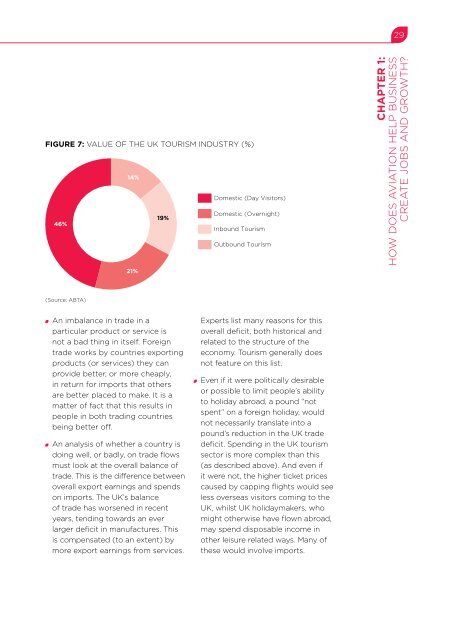Flying in the Face oF jobs and growth - British Chambers of Commerce
Flying in the Face oF jobs and growth - British Chambers of Commerce
Flying in the Face oF jobs and growth - British Chambers of Commerce
You also want an ePaper? Increase the reach of your titles
YUMPU automatically turns print PDFs into web optimized ePapers that Google loves.
FigUre 7: vAlue <strong>oF</strong> tHe uK tourisM <strong>in</strong>dustry (%)<br />
46%<br />
(source: ABtA)<br />
14%<br />
21%<br />
19%<br />
An imbalance <strong>in</strong> trade <strong>in</strong> a<br />
particular product or service is<br />
not a bad th<strong>in</strong>g <strong>in</strong> itself. Foreign<br />
trade works by countries export<strong>in</strong>g<br />
products (or services) <strong>the</strong>y can<br />
provide better, or more cheaply,<br />
<strong>in</strong> return for imports that o<strong>the</strong>rs<br />
are better placed to make. it is a<br />
matter <strong>of</strong> fact that this results <strong>in</strong><br />
people <strong>in</strong> both trad<strong>in</strong>g countries<br />
be<strong>in</strong>g better <strong>of</strong>f.<br />
An analysis <strong>of</strong> whe<strong>the</strong>r a country is<br />
do<strong>in</strong>g well, or badly, on trade flows<br />
must look at <strong>the</strong> overall balance <strong>of</strong><br />
trade. this is <strong>the</strong> difference between<br />
overall export earn<strong>in</strong>gs <strong>and</strong> spends<br />
on imports. <strong>the</strong> uK’s balance<br />
<strong>of</strong> trade has worsened <strong>in</strong> recent<br />
years, tend<strong>in</strong>g towards an ever<br />
larger deficit <strong>in</strong> manufactures. this<br />
is compensated (to an extent) by<br />
more export earn<strong>in</strong>gs from services.<br />
domestic (day visitors)<br />
domestic (overnight)<br />
<strong>in</strong>bound tourism<br />
outbound tourism<br />
experts list many reasons for this<br />
overall deficit, both historical <strong>and</strong><br />
related to <strong>the</strong> structure <strong>of</strong> <strong>the</strong><br />
economy. tourism generally does<br />
not feature on this list.<br />
even if it were politically desirable<br />
or possible to limit people’s ability<br />
to holiday abroad, a pound “not<br />
spent” on a foreign holiday, would<br />
not necessarily translate <strong>in</strong>to a<br />
pound’s reduction <strong>in</strong> <strong>the</strong> uK trade<br />
deficit. spend<strong>in</strong>g <strong>in</strong> <strong>the</strong> uK tourism<br />
sector is more complex than this<br />
(as described above). And even if<br />
it were not, <strong>the</strong> higher ticket prices<br />
caused by capp<strong>in</strong>g flights would see<br />
less overseas visitors com<strong>in</strong>g to <strong>the</strong><br />
uK, whilst uK holidaymakers, who<br />
might o<strong>the</strong>rwise have flown abroad,<br />
may spend disposable <strong>in</strong>come <strong>in</strong><br />
o<strong>the</strong>r leisure related ways. Many <strong>of</strong><br />
<strong>the</strong>se would <strong>in</strong>volve imports.<br />
29<br />
chaPter 1:<br />
How does AviAtion HelP Bus<strong>in</strong>ess<br />
creAte joBs And growtH?


